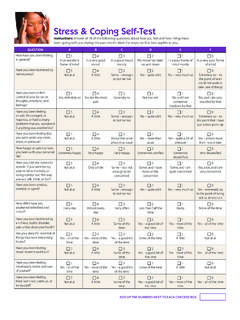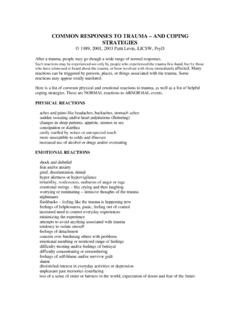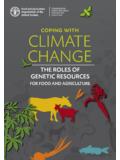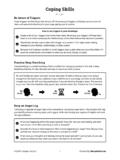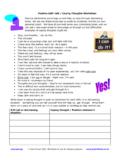Transcription of Relationship between Coping and University …
1 International Journal of Arts and Sciences 3(11): 379 - 392 (2010 ) CD-ROM. ISSN: 1944-6934 Relationship between Coping and University Adjustment and Academic Achievement amongst First Year Undergraduates in a Malaysian Public University Maria Chong Abdullah, Universiti Putra Malaysia, Malaysia Habibah Elias, Universiti Putra Malaysia, Malaysia Jegak Uli, Universiti Putra Malaysia, Malaysia Rahil Mahyuddin, Universiti Putra Malaysia, Malaysia Abstract: This study aimed to investigate the Relationship between Coping efforts amongst first year undergraduates and their University adjustment and academic achievement. 250 first year students attending various undergraduate programs at a Malaysian public University participated in this study.
2 The study employed a correlation design and data was analyzed using descriptive and inferential statistics to address the research objectives. Findings from this study showed that there is a significant and positive Relationship between students Coping and their overall University adjustment, academic adjustment, social adjustment, personal-emotional adjustment, students attachment to the University , and academic achievement. Results also indicated that throughout a period of one semester, students overall adjustment and academic achievement was found to be significantly predicted by their Coping strategies. Keywords: undergraduates, Coping , adjustment, achievement Introduction Attending a University for the first time can be a stressful experience for many college or University freshmen (Dyson & Renk, 2006).
3 They are often confronted with a variety of new personal and interpersonal challenges and failing to meet these challenges and demands has become the most common reason for undergraduates withdrawing from University (Gerdes & Mallinckrodt (1994). In other words, new college/ University students who are unable to adjust themselves to campus life are likely to drop out before they can proceed to the following semester. Previous study by Molnar (1993) has shown that the first six weeks of the first semester in an institution is considered to be a crucial period in determining retention among freshmen. Studies have also demonstrated that adjustment among first year undergraduates has a strong impact on their academic achievement in the universities in which the students are enrolled in (Gibson, & Strauss, 2003, Martin Jr.))
4 , Swartz, & Madson, 1999; Sennett, Finchilescu, Wintre & Bowers, 2007; Zuria, Noriah, & Syafrimen, 2004). In a study conducted in a public University in Malaysia, Ahmad, Noran Fauziah, Azemi, Mohd. Zailani (2002) found that the adjustment problems faced by first year undergraduates included difficulties in course registration, difficulties in understanding textbooks written in the English language, and problem in attending lectures as early as am in the morning. Apart from that, subjects were also found experiencing several health and financial problems. Subjects were found having difficulties in taking care of their health as they reported feeling tired very often. International Journal of Arts and Sciences 3(11): 379 - 392 (2010 ) CD-ROM.
5 ISSN: 1944-6934 Among some of the financial problems reported by students were lateness in receiving funds from their respective providers and that the funds received were insufficient to cater for the expenses incurred during the course of their studies. Based on the examples as mentioned above, adjustment processes undergone by University freshmen should be given serious attention as failure to overcome adjustment problems at this stage could result in students failing to complete their studies. Therefore, new college students will have to draw upon Coping strategies in dealing with their experience of stress when faced with the transition into a University setting (Dyson & Renk, 2006; Subasi, 2009).
6 According to Tinto (1993) individuals who have acquired skills in Coping with new situations or transitions tend to have lesser difficulty in making the transition into college compared with other students. Coping Basically there are two approaches in defining Coping . They are, the traditional approach which describes Coping as trait or style, and the process approach. The traditional approach was based on the ego psychology model which tends to assess Coping traits and styles or disposition rather than processes (Lazarus & Folkman, 1984). Coping traits refer to properties of persons that dispose them to react in certain ways (Lazarus & Folkman, 1984, p. 140). In brief, this approach attempt to identify what the person usually does or is most likely to do when he or she is confronted with a stressful encounter (Folkman & Lazarus, 1988).
7 A process-oriented approach in Coping differs from the traditional trait/style/disposition approach as it is directed towards what a person actually thinks and does within the context of a specific encounter (Folkman & Lazarus, 1988). The process approach addresses the major weaknesses of trait measures of Coping or the traditional approach to Coping which was said to underestimate the complexity and variability of actual Coping processes and was unable to distinguish between automatic responses and those that require effort. (Folkman & Lazarus, 1988). The concept of Coping in this study is based on the process model established by Lazarus and Folkman (1984, p. 141) who defined Coping as the person s constantly changing cognitive and behavioral efforts to manage specific external and/or internal demands that are appraised as taxing or exceeding the person s resources.
8 Therefore, according to this approach, Coping refers only to adaptational activities that involve effort, and not all the things that a person does in relating to the environment. Coping as a process has three main features (Folkman, Lazarus, Dunkel-Schetter, DeLongis, & Gruen, 1986; Lazarus & Folkman, 1984, p. 142). First, observations are concerned with what the person actually thinks of, in contrast to what the person usually does or would do in the trait approach (Folkman, Lazarus, Dunkel-Schetter, DeLongis, & Gruen, 1986). Second, Coping thoughts and actions are examined within a specific context or directed toward particular conditions or situations, and third, a Coping process involves change in Coping thoughts and acts as a stressful encounter unfolds which means that Coping is a shifting process in which a person uses different strategies as the status of the person-environment Relationship changes (Folkman et al.)
9 , 1986). For example, when a student perceives an event as unchangeable or irreversible ( , after the examination results are released), he/she may employ an emotional-focused Coping International Journal of Arts and Sciences 3(11): 379 - 392 (2010 ) CD-ROM. ISSN: 1944-6934 strategy to cope with the situation ( , use distancing to cope with the frustration due to poor grades). The same person may use a different Coping strategy such as problem-focused Coping strategy ( , confrontive Coping ) if he/she finds the stressful situation as manageable ( , before examination). Therefore, the theory of Coping as a process emphasizes two major functions of Coping , problem-focused and emotion-focused (Lazarus, 1993).
10 In general, emotional-focused forms of Coping are more likely to be employed by a person who appraises that nothing can be done to modify environmental conditions that are harmful, threatening, or challenging. On the other hand problem-focused forms of Coping are more likely to be used when such conditions are appraised as amenable to change (Folkman & Lazarus, 1985). In summary, the definition of Coping can be simplified as the cognitive and behavioral efforts to manage psychological stress (Lazarus, 1993). In this study, Coping efforts among first year undergraduates were assessed by the Ways of Coping Questionnaire (WCQ) developed by Folkman and Lazarus (1988). The WCQ measures subjects Coping effort in campus through 8 different types of Coping strategies used which includes Confrontive Coping , Distancing, Self-Controlling, Seeking Social Support, Accepting Responsibility, Escape-Avoidance, Planful Problem Solving, and Positive Reappraisal.



